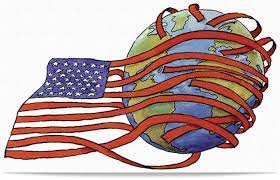Why Is South America Not Relevant On The World Stage?
South America is not geopolitically relevant. When one thinks of the most influential nations, what countries and areas come to mind? Certainly the United States is the most influential. But besides the US, the other areas of the world that have geopolitical heft are all on the Eurasian continent. Europe and East Asia are generally considered the most geopolitically influential after the US. Besides them we also have South Asia (India and Pakistan) and the Middle East. But not South America.
South American countries simply are not relevant on the world stage. You could mention Brazil as a rising power, but they still have a long way to go. Brazil also seems removed from projecting their influence on world affairs. This makes sense though. All the areas mentioned that are influential in the world, besides the United States, are connected in one giant supercontinent.
For a nation not on the Eurasian super continent to have major influence on world affairs, it would have to have extraordinary power. That nation of course is the United States, the single most powerful nation in the world. But a medium sized power removed from the Eurasian continent would have trouble exerting their influence.
It could very well be that if a nation with the power of Germany, France or the UK were in North or South America, they would not be considered influential on the world stage. Many say that those nations are not influential on the world stage as it is. They say those nations are American vassal states.
It may also be that most of the areas that have influence in the world do so because they have multiple countries that are influential on the world stage. Europe has Germany, the UK, France, Russia, and arguably Italy. What’s more, all of those nations, besides Russia, are connected in how they act on the world stage.
Asia has China, Japan, South Korea and India. China and Japan are the second and third largest economies in the world. China is the second most powerful nation in the world, Japan is in the G7, and India is now the most populous nation in the world.
The Middle East has Iran, Saudi Arabia, Israel, Egypt, and Turkey is near. Brazil is arguably more influential than most, if not all, Middle Eastern countries. But taken together, they carry more weight than Brazil. They also are closer to the geopolitical action. Brazil is further away.
There are other countries in South America with nominal power. Argentina and Colombia might be considered small powers, but they just are not very influential. They also do not exert much influence on the world stage. But in a way, it makes sense that South America is not very influential on the world stage.
South American countries, like their North and Central American counterparts, are newer nations. They came to be in the aftermath of European colonization. Their relatively new history make it more difficult for them to be world powers. The United States is the exception to this rule, which is that New World countries are not as powerful and influential on the world stage.
It should also be noted that South America only has 13 countries. The other aforementioned regions have many more countries. Countries with much longer history. It is difficult for this region to give rise to a multitude of influential nations. For much of South America’s history, they have been considered vassal states to the US.
Not having much influence on the world isn’t necessarily a bad thing for South America. They rarely get blowback on the world stage for their actions. They can focus more on themselves. And they don’t have to worry about possible wars or invasion. While they all have had issues with corruption, dictators and inflation, particularly Argentina, they haven’t had to deal with an invasion from another country.
With this all being said, Brazil could still one day become a top power in the world. Maybe Brazil could then inject some of their foreign policy goals into the debate. But until something changes, it looks like South America will continue to be a quiet, non-influential corner of the world.

